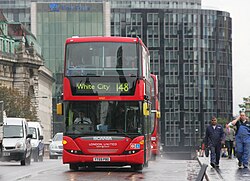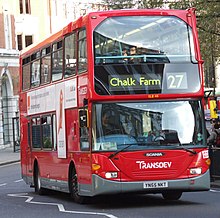London United Busways
This article needs additional citations for verification. (March 2016) |
| File:LondonUnitedRATP.svg | |
 | |
| Parent | RATP Dev Transit London |
|---|---|
| Founded | 1 April 1989 |
| Headquarters | Stamford Brook Garage |
| Service area | Greater London |
| Service type | Bus services |
| Routes | 70 (November 2023) |
| Depots | 9 |
| Fleet | 797 (May 2015) |
| Website | www |
London United Busways Limited,[1] trading as London United, is a bus company operating mostly in west and south-west Greater London. It is a subsidiary of RATP Dev Transit London and operates services under contract to Transport for London.
Company history
Early history


London United[2] commenced operating on 1 April 1989, as one of 12 operating subsidiaries of London Buses in preparation for privatisation. In November 1994 it was sold in a management buyout.
The company's name was derived from the former London United Tramways, that operated trams and trolleybuses in west and south west London until absorbed by the London Passenger Transport Board in 1933. London United adopted the former tram company's insignia, based on the coat of arms of the City of London, as its logo.[citation needed]
In January 1995, London United purchased Westlink[3] with garages in Hounslow Heath and Kingston upon Thames.[4]
In August 1997 London United was sold to Transdev. In 2002 Transdev purchased fellow London operator London Sovereign from the Blazefield Group.[5]
In April 2006 both operations were rebranded with the Transdev name and logo, removing the London United and London Sovereign brands, although both companies continued as separate legal entities.
In November 2009 Transdev purchased NCP Challenger with seven Transport for London contracted routes, 87 buses and garages at Park Royal and Twickenham.[6] These were integrated into the London United business.
RATP Dev
In 2009 Transdev's majority owner, Caisse des dépôts et consignations, commenced negotiating with Veolia Environnement to merge Transdev with Veolia Transport. As part of the resulting agreement, it was agreed that the RATP Group, which had a minority shareholding in Transdev, would take over ownership of some of Transdev's operations in lieu of cash payment.
This resulted in London United transferring to the RATP Group, while London Sovereign remained with Transdev and become part of the merged Veolia Transdev group.[7][8][9][10]
This agreement took effect in March 2011, and RATP Group renamed its newly acquired business London United.[11]
In 2015, a charter unit was established under the United Transit brand with a grey and red livery.[12]
Since July 2021, London United has taken on most routes from RATP's other London subsidiary: Quality Line [13] with routes 413, 463 and S1 being transferred to London General.[14]
In December 2021, RATP's London bus operations including London United were transferred to a RATP joint venture with Australia's Kelsian Group (parent company of Tower Transit) known as RATP Dev Transit London.[15]
Garages
London United operates eight bus garages.
Fulwell (FW)

History
When new, the 11-acre (4.5 ha) site was described as one of the finest plants in the country and was the main depot of London United Tramways with 20 covered tracks. The garage is nowadays divided into two sections, one used by London United, with an entrance off Wellington Road, and the other by Abellio London with an entrance off Stanley Road.
Fulwell was the first garage in London to receive trolleybuses in 1931, and together with Isleworth was the last to operate them until 1962. The last trams operated from the depot in 1935, although some of the tram tracks were, until recently, still visible in the cobbled surface of the Stanley Road entrance. The garage has never reached its capacity, even taking in much of the work from Twickenham when it closed in 1970, and in 2001 107 buses were allocated. In 1999 the garage housed 13 London Country buses after Arriva Croydon & North Surrey shut its Leatherhead garage. The buses on route 85 were operated from the forecourt with Arriva drivers.[citation needed]
Hounslow (AV)
Hounslow garage operates routes 110, 117, 203, 419, 696, 697, 698, E1, H22, H37 and H98.[16]
History
Hounslow garage was opened by the London General Omnibus Company in 1913 on the former site of the District Railway's Hounslow Town station. The garage along with many others was requisitioned in the First World War. Hounslow was the subject of two firsts in 1925 and 1930 with the first pneumatic tyre buses and the original Dennis Dart allocated respectively. The garage had one problem though: the roof was too low and only open toppers and single deck vehicles could use the depot until the mid-1930s when the roof was raised.[citation needed]
A London Transport survey in 1947 found that 92 vehicles were allocated to Hounslow, a garage with a capacity of 72. This was mainly achieved by parking buses on a plot of land behind the garage that was also used to stand vehicles terminating there on layover. The garage was rebuilt in the early 1950s and included a new bus station in front of the garage. The planned allocation was now up to 120 vehicles, although the allocation in 2002 was 127.[citation needed]
Hounslow's first one-man operated double deckers were MCW Metrobuses delivered in 1982 for routes 111 and 202. With the allocation still high, Hounslow runs a number of night services on behalf of other London United garages to enable it to fit the buses into the garage. It was also the first garage in London to operate a low-floor bus with the arrival of Wright Pathfinder bodied Dennis Lance SLF in December 1993.[17]
There were plans to relocate the garage away from the town centre, and allow the expansion of the adjoining bus station. In 2005 an unsuccessful planning application for a site in Hanworth Road was lodged. This was largely due to a campaign by residents overlooking the site.[citation needed]
Hounslow Heath (WK)

As at June 2020, Hounslow Heath garage operate routes 105, 116, 235, 423, KU1, KU2 and KU3.[16]
Park Royal (RP)
Park Royal garage operates routes 18, 220, 224, 228, 258, 266, 440, N18 and N266.[16]
History
Park Royal was opened by NCP Challenger on 26 May 2007, on the site of the former Metroline garage (HR) in Atlas Road, Park Royal, which had closed in 2005.[citation needed]
Shepherd's Bush (S)
Shepherd's Bush garage operates routes 49, 70, 72, 94, 148, C1 and N72.[16]
History
Shepherd's Bush garage opened in 1906.[citation needed]
Stamford Brook (V)

Stamford Brook garage operates routes 9, 211, 272, 283, E3, and N9.[16]
History
Stamford Brook opened as a bus garage in 1980 after a two-year construction. Originally built as Chiswick Tram depot, it had latterly been used to operate the British European Airways bus service between Heathrow Airport and the West London Air Terminal on Cromwell Road.[citation needed]
The original plan was to create a temporary home for the Riverside garage buses and staff whilst that garage was re-built with a view to taking on the workload from Mortlake and Turnham Green which were to close. However this idea was changed and the garage took on the work from Turnham Green which closed and also inherited the garage code V. Following service reductions, Mortlake and Riverside closed in 1983, with some of their work moving to Stamford Brook.[citation needed]
In 1981 Stamford Brook took on Airbus routes A1 and A2 following the withdrawal of the existing British Airways services between Heathrow Airport and central London. These vehicles were transferred in 1994 to West Ramp (which became an outstation of V) leaving the garage with an allocation of MCW Metroriders, MCW Metrobuses, Leyland Olympians and Dennis Darts.[citation needed]
Tolworth (TV)

Tolworth garage operates routes 85, 293, 406, 411, 418, 465, 467, 613, 639, 655, 662, 665, 670, K1, K2, K4, K5 and S3.[16]
History
Tolworth was built on the site of a former coal yard behind Tolworth railway station.
Tolworth was originally planned in the late 1990s following the closure of Kingston Garage and the announcement that the site was to be part sold off and part converted into the new bus station. A recruitment centre was opened on Tolworth Broadway long before building work ever started.[citation needed]
Route K5 transferred to Tolworth from Quality Line on 25 January 2020. Routes 406, 418 and 465 transferred to Tolworth from Quality Line on 25 April 2020.[citation needed]
Twickenham (NC)
History
Twickenham garage was opened by NCP Challenger on 12 November 2005.[citation needed]
On 31 March 2012, route 493 passed to London General.[18]
Fleet
As at May 2015, the fleet consisted of 797 buses.[19]
References
- ^ Companies House extract company no 2328561 London United Busways Limited
- ^ Companies House extract company no 2328561 London United Busways Limited
- ^ Companies House extract company no 1983867 Stanwell Buses Limited
- ^ Development of Organised Transportation in London Transport for London January 2013
- ^ London Sovereign Transdev
- ^ NSL sells London buses to Transdev Archived 12 August 2014 at the Wayback Machine Bus & Coach Professional 24 November 2009
- ^ "Merger of Veolia Transport and Transdev". Veolia Transport. Archived from the original on 27 July 2009. Retrieved 5 May 2010.
- ^ French moves in London Archived 20 August 2014 at the Wayback Machine Bus & Coach Professional 6 May 2010
- ^ "Completion of the merger of Veolia Transport and Transdev". Transdev. Archived from the original on 7 March 2011. Retrieved 13 April 2011.
- ^ "The new scale of the RATP Group". RATP. 2011. Archived from the original on 21 July 2011. Retrieved 4 March 2011.
- ^ "RATP seeks partnerships and purchases". Buses Magazine. Ian Allan Publishing Ltd. May 2011. pp. 8, 64.
- ^ "Familiar colour mix in brand new identity for RATP commercial fleet" Buses issue 723 June 2015 page 21
- ^ Short Hops Buses issue 795 June 2021 page 24
- ^ "RATP Dev to close its Quality Line subsidiary". 12 January 2021. Archived from the original on 4 February 2021. Retrieved 29 January 2021.
- ^ "Joint Venture Completion - RATP Dev Transit London Ltd". 13 December 2021. Retrieved 17 December 2021.
- ^ a b c d e f "Our Services". RATP London. Retrieved 16 September 2021.
- ^ LLW1-10: London United countrybus.org
- ^ Bus tender results Route 493 Transport for London 5 May 2011
- ^ Carr, Ken (May 2015). The London Bus Guide (5 ed.). Boreham: Visions International Entertainment. p. 30. ISBN 978-0-9931735-3-0.
External links
 Media related to London United Busways at Wikimedia Commons
Media related to London United Busways at Wikimedia Commons- Official website
- Kingston University Timetable:
